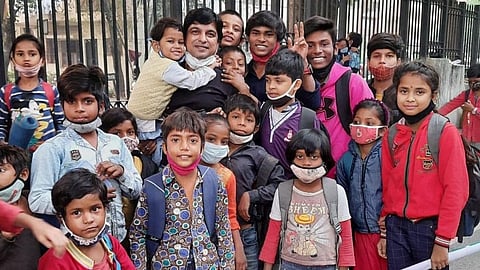World Literacy Day| Meet 'Taleem Sir' from Lucknow who's on a mission to educate slum kids of India
Ever wondered how your country is faring on the literacy and education front? While there is a huge difference between the terms, let's first talk about the significance of today — World Literacy Day.
The day, celebrated every year on September 8, holds immense value in raising awareness about and concern for the obstacles faced in providing quality, equitable and inclusive education for all within local communities and internationally. It makes us wonder about the importance that knowledge holds, and urges us to rethink certain definitions and how they have changed with time.
This year, the theme is 'Transforming Literacy Learning' and to discuss the same, we got in touch with Taleem, an NGO working at the grass-root level to achieve the said goals in the downtrodden slums of India.
Literacy — a step towards education
Talking about literacy in India, anyone, above the age of seven, who can read and write is considered to be a literate person in the country. Let's narrow down to the states, shall we? While Kerala is currently the most literate state with 93 percent of the population qualifying as literate, Bihar ranks lowest with 63.82 percent population falling under the ambit.
While the literacy rate in India has significantly improved to an impressive 77.7% , the nation still has a long way to go. Factors like caste discrimination, gender discrimination, economic disparities and technological barriers are just a few problems India faces when it comes to equitable and quality education for all.
In conversation with Taleem
Now that the surface information is sorted, let's dive deep into the reality. Taleem (literally translated into 'education' from Urdu) Society, an NGO established in 2012, has been working continuously to uplift the underprivileged. From providing basic education to taking care of the food and hygiene of children living in slums, Taleem has a clear-cut vision — to change the face of education and educate more and more children, the future of the country. For this, they have settled at the rustic roots and have been, for a decade, helping to build the needy.
Saurabh Asthana, also referred to as 'Taleem Sir' lovingly by his students, works along with his wife Amina Iqbal. The duo, hailing from Lucknow, has worked day and night for the cause. Asthana talks about literacy in India:
The literacy rate in India has significantly improved in terms of the percentage. What, according to you, is the reality? How is the basal situation in India's slums?
The slums in India mainly comprises those who have migrated from their native places to metropolitan cities in search of jobs and to improve their living situation. Every slum cluster has about 1000 people and when it comes to education, the slum dwellers have numerous constraints. For starters, every member of the family is occupied in some work or the other, then comes the issue in travelling, trusting others with their children and so on.
Unfortunately, the situation is not good. Taleem is working inside the slums to improve the same.
Children in slums and education — how does it look?
Taleem is working inside slums of Delhi, Noida, Ghaziabad and Punjab for now. Children are easy prey to various problems, from casteism to sexual harassment. They are the most vulnerable and highest in number. Thus, they not only have to be taught to read and write but have to, more importantly, be sensitised about the basic child rights.
To merely get the parents to allow their kids to enroll for a literacy programme, we have to counsel them and make them trust us. This is why we started working amidst the rural people, which eliminated most fears parents have when it came to sending children to classrooms.
In India, any person over seven years who can read and write is considered literate. Talk to us about it.
Well, the technical reality is pretty different. Literacy, according to me, should mean that you know the difference between rights versus duties, are rational and are capable of surviving in this world on your own.
With the advancement of technology and dependence on computerised systems, literacy has taken a different shape altogether.
Having overall control over one's life should be the goal.
Taleem has served over 10,000 people pan India. What is the vision, the future plans?
We want to take care of our existing student-base and increase the number across India. Taking as many students as possible under the umbrella of education is the ultimate aim.
The tendency of dropping out of school is high amongst the slum kids and working continuously to teach them till they reach the level of formal education itself is a hard task. We are planning more centres of Taleem in Lucknow, Indore and Dehradun in coming 5-6 months.
Have the literacy programmes suffered due to the pandemic?
Since we're working with migrant population in general, during the pandemic, a large number of students migrated back to their homes. We did not have enough data to track where they migrated to or how they were doing. It was one of those things where you just don't have control over the situation. People also lost their jobs, since most of them were daily wagers. They started focussing on earning than learning, in order to survive. However, we're all trying to recover.
How can a normal person help contribute to the cause?
Anyone can contribute and in various ways. From providing study materials, food and/or hygiene items to volunteering physically at our numerous programmes, we're happy with all the help we can get.
The right path
While the work is extremely rewarding, shares the 'Taleem Sir', it also is a huge responsibility to carry. Taleem is helping build careers of thousands of students who are looking up to him for guidance and knowledge and it is a pleasure to serve the nation in any which way possible, he adds.
Although the World Literacy Day today can be perceived from many angles, looking within is always hard. Observing the ground reality and making efforts to improve them is the only way literacy in India can be taken to another level. The country has a long way to go when it comes to educating children but we're glad we're on the right path!
To get all the latest content, download our mobile application. Available for both iOS & Android devices.

